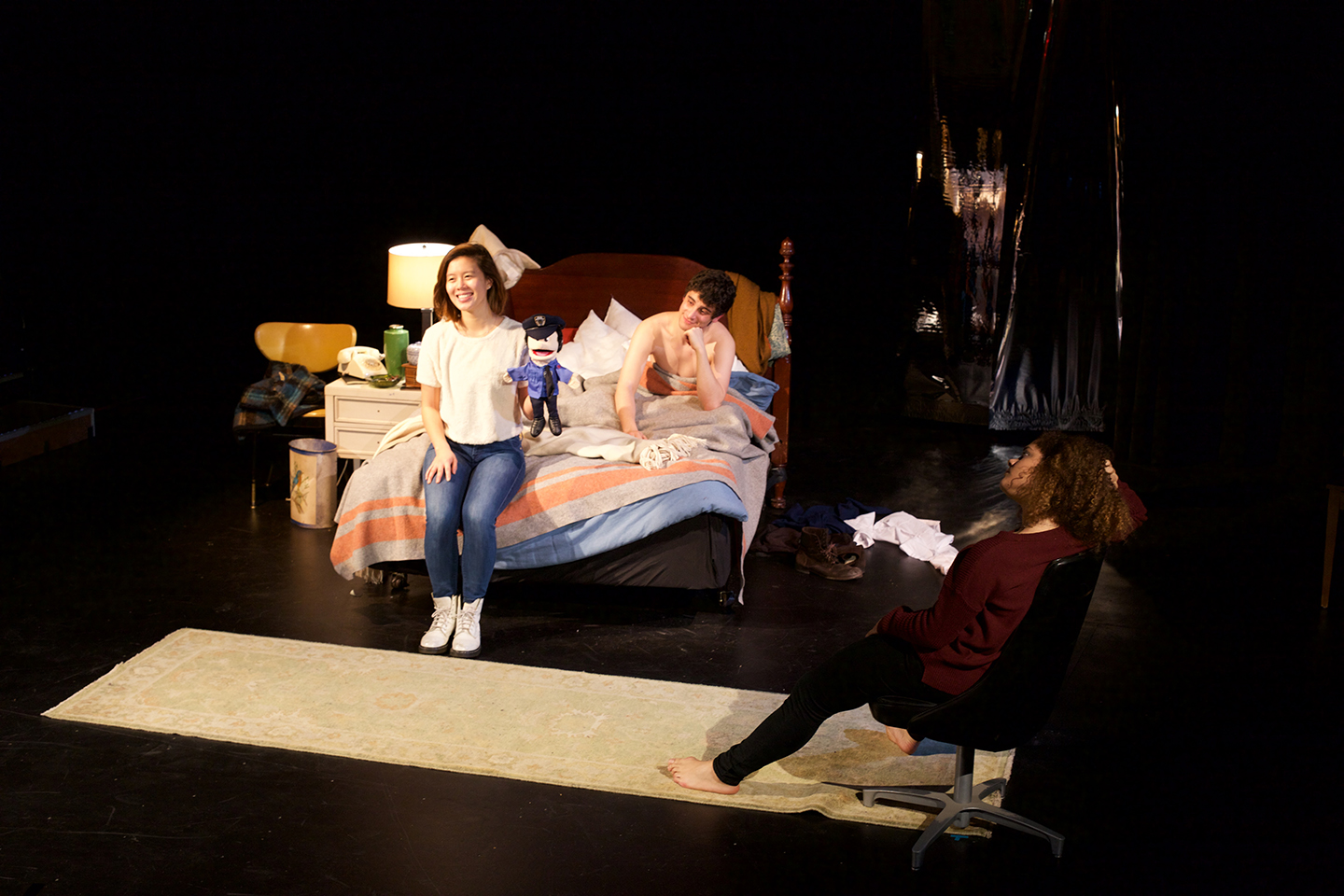
A girl walks across a stage in dim lighting, pauses a moment, then walks offstage. There is silence. Then the stage lights turn on. Craig, a high school junior played by Alec Mukamal ’18, who is sitting on top of a desk and holding a puppet dressed in a police uniform begins to speak. He is practicing a presentation for his African-American history class, in which he converses with ventriloquist puppet Lance, a middle-aged man/puppet from Georgia about his interracial marriage to Ling Ling, a Chinese woman/puppet. Craig’s voice rises and falls as he argues with Lance on everything from the definition of whiteness to his experiences learning from his fellow classmates. When he concludes, Craig’s girlfriend Jenny enters and hugs him.
Perhaps this five-minute opening monologue sets the scene for the following 45 minutes of “Jenny (Craig)”. The play is bold and unorthodox, yet simultaneously naturalistic and intuitive, weaving together moments of almost improv-like realism (a teenage couple sits on a bed discussing the merits of Food Network chef Guy Fieri) and fantastical moments of pure imagination. “Jenny (Craig)”, written by April Wen ’17, details an evening in the life of Jenny, a biracial black high school junior, following her interactions with Craig, her white boyfriend from her African-American history class and Bibbe, her Chinese-American alter ego, as she attempts to understand her relationship with Craig and the world around her. In its exploration of these relationships, the play touches on the themes of race, surveillance, image and relationship between one’s internal self and public persona.
I entered the Morse Crescent Theater unsure of what to expect. Unlike most theater productions on campus, the play reflects Wen’s unique background in film and media studies. The play itself was written as an extension of a short film entitled “Tactic (TV)” produced by Wen for the first part of her senior thesis. In the short film, the camera voyeuristically follows Olivia Klevorn ’18, originating her role of Jenny, as she rides the New York City subway home, fading in and out of reality, as extended shots of Stefani Kuo ’17, as Bibbe, give insight into Jenny’s internal mental processes. Wen incorporates clips of this original film throughout the play along with other media elements, like security cameras, a move which contributes to an increasingly eerie feeling of constant surveillance.
The only reprieve Jenny feels from this surveillance — in class, walking down the street, by the police, even with her boyfriend — is when she is with Bibbe. Dressed in a white crop top and Dr. Martens, Bibbe resembles a relatable older sister more than a spiritual guide. When she appears as Bibbe, Kuo brings an unexpected light and ease to the production, as the audience can see Jenny relax fully for the first time in the show. The easy chemistry between the two actors fuels Wen’s purpose; Bibbe and Jenny are the same.
“Jenny (Craig)” acts as a meditation on race and the impact of outside perception on Jenny’s understanding of herself. Early on in the play, an initially innocuous conversation between Jenny and Craig devolves into a screaming match over his attempts to understand her experiences as a woman of color and her frustration with having to teach him about her life. Another powerful scene shows a tense encounter between Jenny and a Saks Fifth Avenue security guard, an encounter that is colored by racial assumptions. My personal favorite scene occurs when Bibbe, playing Lance’s wife Ling Ling, acknowledges some of the scrutiny the couple has received for their interracial relationship. While the play acknowledges that, as a modern-day interracial couple, Jenny and Craig do not face the same criticism as Lance and Ling Ling, Jenny connects with the emotions underlying the couple’s experiences. In this interaction, the audience is forced to wonder how closely Jenny’s feelings mirror Ling Ling’s and thus, how much Jenny subconsciously associates Craig with the flippant Lance, despite Craig’s efforts to understand her experiences as a person of color.
The mind of Jenny, or any teenage girl, or any person in general, is a different world from that in which they live. Perhaps not every person’s internal realm is as complicated as Jenny’s, but “Jenny (Craig)” seems to suggest everyone’s may be. I am not going to pretend I understood everything about the performance. I am sure I missed small things and have maybe interpreted some moments incorrectly. But perhaps, this is Wen’s point. In terms of action, very little actually happens. The events of the play all take place over the course of one evening: A boy practices; a girl remembers, then reimagines a memory; the two spend an evening together. Told in a nonlinear fashion, the play is unbelievably creative in its use of time and space, in a way that feels neither contrived or cliche, while the performances, for the most part, feel natural and nuanced. In spite of its seemingly “out-there” subject matter, it is refreshingly pensive. A part of me wishes the play dived more into specific moments, like Jenny and Craig’s explosive fight at the beginning of the play, or left fewer ideas open-ended. But maybe as Jenny explains to Craig in their argument, she isn’t meant to be our tutor. Much like Jenny and the rest of the characters, we can only work with what we see at face value and must devote the rest our time trying to understand the internal realm underneath.
Contact Ryan Howzell at ryan.howzell@yale.edu .







